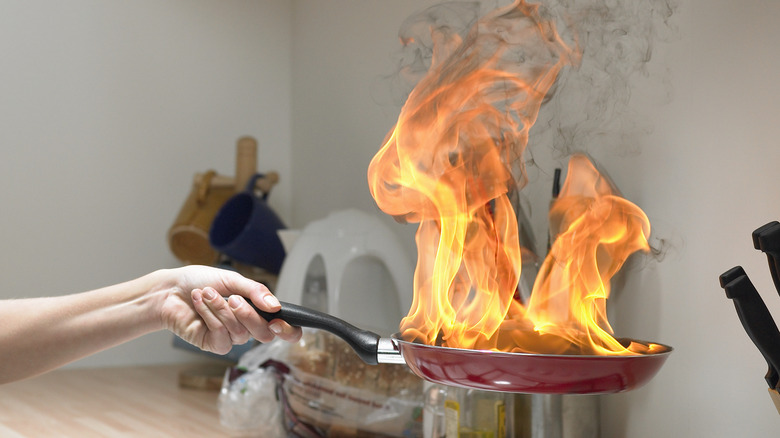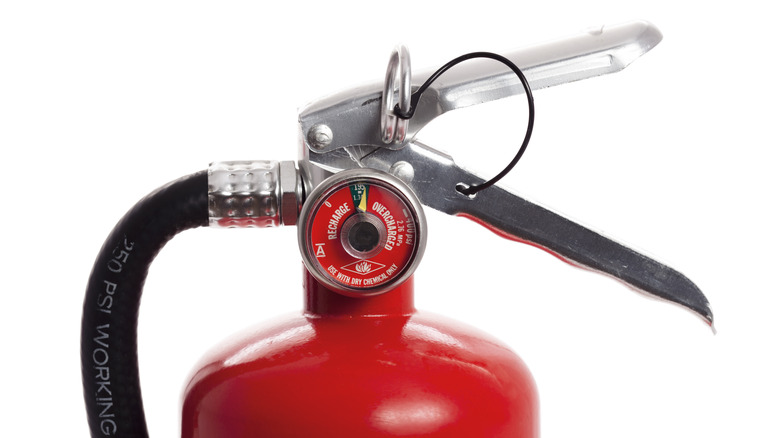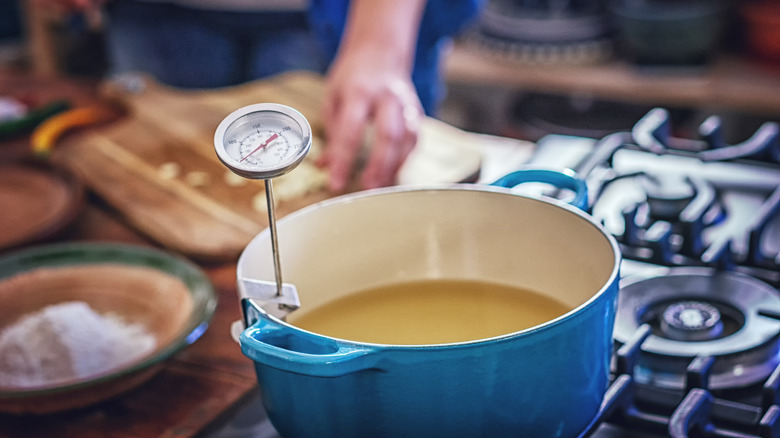Baking Soda Is Key For Safely Putting Out Grease Fires
It's not easy to keep a cool head during a kitchen fire. Even a minor spark can be cause for alarm. But the best tactic for staying calm is to prepare ahead of time by keeping a box of baking soda near your stove and within easy reach.
In an ideal world, we would never set cooking oil on fire, but accidents do happen. And when they do, a large amount of baking soda can help snuff out smaller blazes. Spread it across the flames in a thick, even layer to put them out, focusing on the fire closest to the grease rather than trying to smother the top. The ingredient degrades into dense carbon dioxide when heated and settles on top of the flareup to cut off its oxygen supply.
Although the baking ingredient can't halt a major blaze, it may do the trick if you act quickly to squelch a little fire before it grows bigger. Fat and oil-fueled flames can spread surprisingly fast and leap onto surrounding fabrics, which is why fast reflexes and a ready solution are all the more important.
Other tools to help tame grease fires
Although water can quench burning logs and lit matches, the liquid will only fuel and spread a grease fire. So, never use water in this scenario. To successfully stop a grease fire in its tracks, you need to suffocate the flame. In addition to baking soda, salt can also work for this purpose by forming a barrier against oxygen — but, similar to baking soda, you'll need to use a lot to tame the flame.
For bigger kitchen blazes, however, your best move is to combine the power of the cooking ingredients with impermeable metal. Grab a metal lid or a sheet pan and place it on top of the flames, then dust remaining flickers with the baking soda. Make sure your burner is turned off, but don't waste time moving the pot or pan, as that risks expanding the fire and causing injury.
Also, keep a fire extinguisher on hand in case of emergency. But just know that unleashing the suppressant will contaminate your dinner. On the same note, if a kitchen fire requires any chemicals to take it out, make sure to throw away any exposed ingredients, produce, and foods contained in paper or screwtop packaging, per the USDA. Pots and pans, as well as sealed canned items, will need a thorough wash, as will dishcloths.
Avoiding sparks before they start
It's just as helpful to know how to prevent a kitchen fire as it is to fight one. An annual Thanksgiving lesson that bears repeating all year long is to avoid deep-frying frozen foods in hot oil. The high water content in the meat will rapidly turn to steam and expand up and out of the fryer, spraying dangerously hot, flammable liquid across your kitchen. That's why, before frying your turkey, you should always take the time to fully defrost the bird and pat it dry.
Speaking of fryers, always keep an eye on the temperature of your cooking oil. Smoking hot grease can quickly light into a blaze, so if your vegetable oil exceeds 450 degrees Fahrenheit, make sure the heat is turned off and the oil is allowed to cool back down. Make sure to also keep your cooking equipment clean to avoid any extra spark points. Use all the baking soda you've saved to scrub blackened pans and remove gunk from deep fryers.
Finally, keep in mind that other liquids can fan flames just like water does. Try to avoid getting buttermilk, wet brines, and other dripping additives when deep frying. They can cause splatter that could reach stovetop burners and trigger a fire. Similarly, remember that other powdered ingredients can't substitute for baking soda when it comes to smothering a flare. Baking powder, flour, and confectioners sugar will only make things worse.



